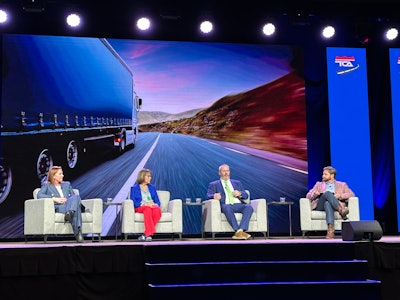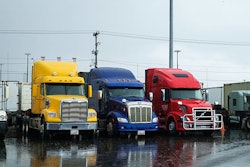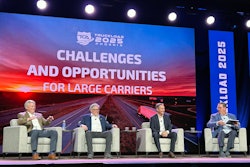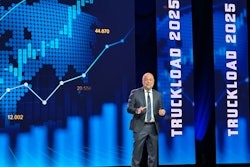
Brown Dog Carriers in Maine launched its business with just two trucks but nearly doubled its fleet size overnight after winning a single contract. Now the company operates 25 trucks in the New England region, still with a heavy focus on that one customer that supplies a majority of its business. President and Co-founder of Brown Dog Carriers Graig Morin said that focus on elite customer service is what has helped the carrier stay in business through the recent freight recession that continues to drag on.
ATA’s Chief Economist Bob Costello shared a behind-the-scenes look at the freight recession during the Truckload Carriers Association annual convention held this week in Phoenix. Costello has heard from many who have been in the trucking industry for decades that this has been the toughest economic environment they’ve experienced, which he said surprised him in relation to the Great Recession … until he dug into the data.
“The Great Recession was like ripping off a Band-Aid. It hit hard, but it happened in less than a year,” he said. “This downturn lasted a lot longer than we're normally used to seeing. You had rate proxies fall more during this period than we're used to seeing in percentage terms, but … at the same time, your volumes were down, your rates were down, your costs continued to go up for the macro economy.
“That's what we call stagflation,” he added. “It is the worst place to be, but that's exactly where you've been.”
Costello said he expected the freight economy to slowly grow in 2025 and 2026, but with uncertainty surrounding looming tariffs, that could be a different story. And he said he expects many carriers to exit the market.
Morin’s company is hanging in there. He, alongside three other small carriers, spoke Monday during Truckload’s small carrier panel about how he’s making it work.
Traversing a negative freight economy
With the limited resources of a small carrier competing in a tight market against larger carriers with more, Morin said his company focused on the low-hanging fruit to help lower operational costs. The company focused on improving idle time, switched insurance companies for a lower rate, kept its office staff to a minimum and worked with its truck supplier (leased equipment through Ryder) on fixed costs.
Amber Edmondson, president and CEO of Trailiner Corp., which runs 70 trucks under its authority with another 75 that pull its trailers (230 refrigerated), said though her company is small, it did a lot of things like the larger carriers to flesh out its bottom line.
“We kept our equipment a little bit longer – made sure we were taking care of the maintenance on that as we were extending the life while we owned it. Our shop was open seven days a week; we cut back those hours,” she said. “(We) looked at software that can make us more efficient, so that when we do have a turn, hopefully we're better positioned to grow at that point.”
Edmondson said her company is also currently investing in technology, integrating its transportation management system with a tool that will automate a lot of processes and make decisions around load acceptance and assignment.
[RELATED: Applications of AI in the trucking industry]
“I do think that technology can help level the playing field from a small carrier perspective because the large carriers have a lot more resources than we do, and technology opens up some opportunities for us to do more with fewer people,” she said.
Morin said his company is in the process of changing TMS providers and uses telematics to drive safety and more efficient operations. Though she is “not a technology person,” and her company operates on the same TMS it has had since the 90s, Shelley Koch, president and owner of K&J Trucking Inc., said she has invested in technology on the safety side as well, especially as it relates to coaching drivers because it has had a significant return on investment.
Koch said her company, which operates with 120 trucks and 200 refrigerated trailers, is unique in that every time there has been a downturn, it has found that to be an opportunity for growth. Her fleet, she said, has grown about 20% over the last two years.
To save money, she said K&J has been slow to order truck replacements; it went to a five-year turn on its equipment, whereas it typically runs a four-year turn. But the company also purchased more equipment in the past 12 months from another company that went out of business and sold K&J some late-model used equipment at a fraction of the cost. The company also started outsourcing labor in its shop, which she said has been very beneficial.
“We also looked at all of our processes in house and our software and just evaluated it,” she added. “To be honest, we didn't find a ton of savings, which was also good, but we just were able to understand what our costs were a little bit better.”
Shaking up mix of freight
Edmondson said Trailiner operated at about 90% contract and around 10% spot prior to the economic downturn; now that’s more like 75/25%. The company has sought to diversify its freight mix in recent years to shift from seasonal to more consistent freight as it has historically been heavily focused in hauling produce.
Adam Blanchard, co-founder and CEO of Double Diamond Transport with 100 trucks and 300 trailers, said he has always tried to maintain a healthy mix.
“Bob's slide earlier showed me exactly what I knew, which is living in the spot market has not been fun in the last few years,” Blanchard said.
In 2024, contract loads were down a little over 3%, and spot market loads were down over 30%, while operational costs have continuously been on the rise – up 1.7% in 2020, 9.7% in 2021 and 2022 and 6.6% in 2023. Average revenue per mile was on par with costs in 2019, but every year thereafter, costs were higher than revenue, Costello said, with costs rising 25% above revenue in 2024.
Because of those rising costs, he said he anticipates seeing even more carriers exit the market despite expected improvements in the freight economy. A lot of the carriers leaving the market are one-truck operations that came on the scene during the freight boom and have since exited or will exit because of the spot market environment. But Costello said the market could still see other carriers leave because they’ve been hoarding debt and deferring maintenance, which could cause them to go under.
[RELATED: Top truckload carriers strategize for profitability]
Carriers with interstate operating authority are leaving the market, according to data from FMCSA – down 10.6% from December 2022 to January 2025.
“The cumulative effect of this is huge and something some of these smaller fleets cannot get out of,” Costello said.
While carriers have little control over the spot market, Edmondson said in the contract space, you have to be willing to walk away from potential customers if the rate doesn’t make sense for you.
Koch said it’s difficult for small truck lines to not be reliant on one customer, so her company has focused on customer service. Morin agreed, adding that small carriers need to partner with customers who have the same mindset and are willing to pay your preferred rate to get the customer service they desire, ensuring their freight arrives safely and on time.
“We do not go to the spot market. We rely all on our customers’ freight,” Morin said. “We focused heavily on (one) customer. We still do. They’re still a majority of our business … We are working on more customers, but we always focus on the customers that will work well with us so that we are a true team.”











